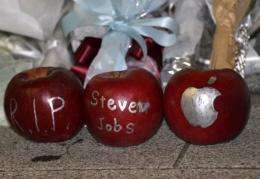The Steve Jobs credo: 'Stay hungry, stay foolish'

Like most commencement addresses, the June 2005 speech delivered by Steve Jobs offered the college graduates pearls of wisdom as they finished their studies and prepared to embark on life's way.
But the oft-cited graduation speech to students at Stanford University also offered a fascinating glimpse into the twists and turns of the Apple chief executive's remarkable life, and the Zen-like philosophy that fueled his creative passion and helped govern his tireless energy.
"You've got to find what you love," Jobs told students in the now famous address, urging them as he wrapped up his speech to "stay hungry, stay foolish."
The Apple visionary, who died Wednesday, then proceeded to recount his own story: a life presented in three acts, starting from his birth to a young unwed mother who put him up for adoption after first extracting a promise from the adoptive parents that they would one day send the baby to college.
"And 17 years later I did go to college," Jobs recounted at Stanford.
"After six months, I couldn't see the value in it," he said. "I decided to drop out and trust that it would all work out OK," he said, adding that he decided to abandon his studies at Reed College in Portland, Oregon, to found his groundbreaking Apple Computers company at age 20 in his parent's garage.
"It was pretty scary at the time, but looking back it was one of the best decisions I ever made," Jobs recounted.
The lessons he learned, Jobs said, were much more far-reaching.
"You have to trust that the dots will somehow connect in your future. You have to trust in something -- your gut, destiny, life, karma, whatever," he said. "This approach has never let me down, and it has made all the difference in my life."
Jobs shared more lessons gleaned from what was perhaps the low point of his professional life: his ouster by the board of directors from the helm of Apple in 1985 -- a "devastating" episode marked, he said, by "love and loss."
"How can you get fired from a company you started?"
But once again, what had appeared to be great misfortune emerged as a blessing in disguise.
"Something slowly began to dawn on me -- I still loved what I did," he told the Stanford students.
"I had been rejected, but I was still in love. And so I decided to start over. I didn't see it then, but it turned out that getting fired from Apple was the best thing that could have ever happened to me," he said.
"It freed me to enter one of the most creative periods of my life."
Jobs described creating new startup ventures, both of which became wildly successful in their own right: Pixar, which now is the most successful animation studio in the world, along with the computer and software company NeXT.
The success of the latter venture paved the way for his triumphant return to Apple, when in a remarkable turn of events, Apple bought NeXT.
"I'm pretty sure none of this would have happened if I hadn't been fired from Apple," he said.
"It was awful-tasting medicine, but I guess the patient needed it. Sometimes life hits you in the head with a brick. Don't lose faith."
Jobs's speech to the Stanford graduating class a half-dozen years ago -- which has since been viewed more than 4.5 million times on YouTube and was replayed in its entirety Thursday on CNN -- was filled with more sage advice, including, a caveat as they set about the task of choosing their life's work.
"You've got to find what you love," he said. "That is as true for your work as it is for your lovers."
Another Jobsian gem: "Your work is going to fill a large part of your life, and the only way to be truly satisfied is to do what you believe is great work. And the only way to do great work is to love what you do. If you haven't found it yet, keep looking."
Yet another: "For the past 33 years, I have looked in the mirror every morning and asked myself: 'If today were the last day of my life, would I want to do what I am about to do today?' And whenever the answer has been 'No' for too many days in a row, I know I need to change something."
The third act of Jobs's speech dealt with his pancreatic cancer, the illness that ended up claiming his life.
"Remembering that I'll be dead soon is the most important tool I've ever encountered to help me make the big choices in life," he said.
"Remembering that you are going to die is the best way I know to avoid the trap of thinking you have something to lose. You are already naked. There is no reason not to follow your heart."
(c) 2011 AFP

















